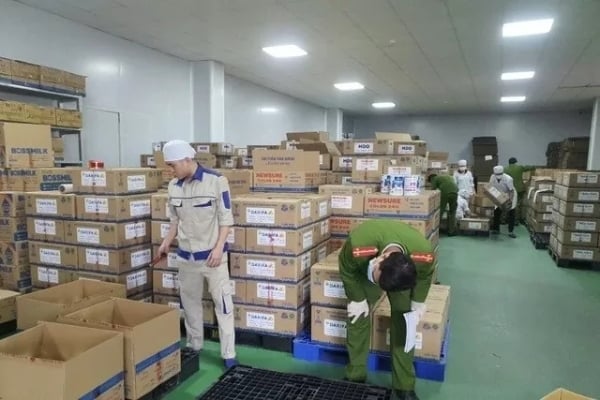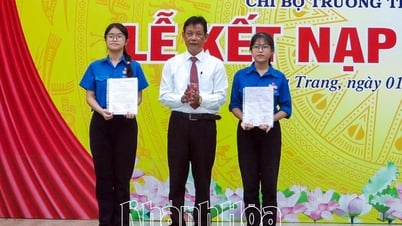Not within the scope of licensing and management of the Ministry of Industry and Trade
The Ministry of Public Security 's recent crackdown on a huge fake milk case with revenue of nearly 500 billion VND at Rance Pharma International Pharmaceutical Joint Stock Company and Hacofood Group Nutrition Pharmaceutical Joint Stock Company has raised public concern about market management.
Responding to the press about the responsibility of state management for the above-mentioned violating dairy products, Mr. Tran Huu Linh - Director of the Department of Domestic Market Management and Development (Ministry of Industry and Trade) affirmed: The licensing and management of dairy products supplemented with micronutrients, functional foods, and pharmaceuticals with special nutritional ingredients is under the authority of the Ministry of Health according to the provisions of Decree 15/2018/ND-CP.
Meanwhile, the Ministry of Industry and Trade is only responsible for the group of regular processed milk products. In addition, the issuance of business registration certificates to enterprises is carried out by the Department of Planning and Investment of localities. Therefore, the two companies Rance Pharma and Hacofood Group are not under the specialized management scope of the Ministry of Industry and Trade.
"We can only inspect when there are signs of violations within our assigned functions," Mr. Linh emphasized.
Although not directly managing the two businesses, according to Mr. Tran Huu Linh, the Ministry of Industry and Trade still regularly directs market management forces to coordinate with inter-sectoral agencies to strengthen inspection and supervision of the milk and functional food markets.
Police seized thousands of boxes of fake milk powder of various types to serve the investigation. (Photo: CAND)
In 4 years (2021-2024), the Market Management force nationwide inspected and handled 783 violations related to milk products. The total administrative fine was more than 2.2 billion VND, tens of thousands of violating products were destroyed, including more than 58,000 milk cartons, nearly 21,000 bottles/cans...
In Hanoi alone, 53 cases were detected and fined with a total value of over 200 million VND. Notably, in 2024, the Hanoi Market Management Department transferred two cases with signs of criminality to the police for investigation.
A typical incident occurred in January 2024, when authorities discovered a truck carrying 3,000 cans of unlabeled, unknown-origin powdered milk at Vinhomes Ocean Park urban area (Gia Lam). At the same time, a business in Dong Anh district was discovered to have more than 123,600 milk and dairy products with signs of altered expiration dates and substandard quality.
Why do violations still slip through the net?
According to Mr. Linh, the fact that some businesses have many product lines distributed widely but are not detected for violations for a long time may stem from a number of reasons. Businesses "blind" the management agency with full legal documents and records. Only when the products are tested will violations be discovered.
Counterfeit milk products are often not distributed through supermarket chains or large agents, but are mainly sold directly through seminars, clinics or personal marketing, making inspection difficult. In addition, the use of celebrities to promote and sell products via social networks is also a sophisticated trick to avoid supervision.
After the shocking incident, the Department of Domestic Market Management and Development said it would tighten inspections at unofficial distribution channels such as small retailers, e-commerce platforms, and social networks - places with high risks of counterfeit and poor quality goods.
At the same time, the Ministry of Industry and Trade is coordinating with the Ministry of Health and the Ministry of Agriculture to comprehensively review the goods circulation process, especially after the distribution stage. The goal is to perfect the inter-sectoral coordination mechanism, increase the effectiveness of handling commercial fraud and ensure food safety.
“We identify our core mission as protecting consumer rights, ensuring market stability and transparency, especially for products that directly affect public health such as milk,” Mr. Linh emphasized.
Minh Thu



![[Photo] Ready for the top competitions of Vietnamese table tennis](https://vphoto.vietnam.vn/thumb/1200x675/vietnam/resource/IMAGE/2025/5/18/9c547c497c5a4ade8f98c8e7d44f5a41)

![[Photo] Many young people patiently lined up under the hot sun to receive a special supplement from Nhan Dan Newspaper.](https://vphoto.vietnam.vn/thumb/1200x675/vietnam/resource/IMAGE/2025/5/18/6f19d322f9364f0ebb6fbfe9377842d3)


![[Photo] Party and State leaders attend the special art program "You are Ho Chi Minh"](https://vphoto.vietnam.vn/thumb/1200x675/vietnam/resource/IMAGE/2025/5/18/6895913f94fd4c51aa4564ab14c3f250)






















































































Comment (0)